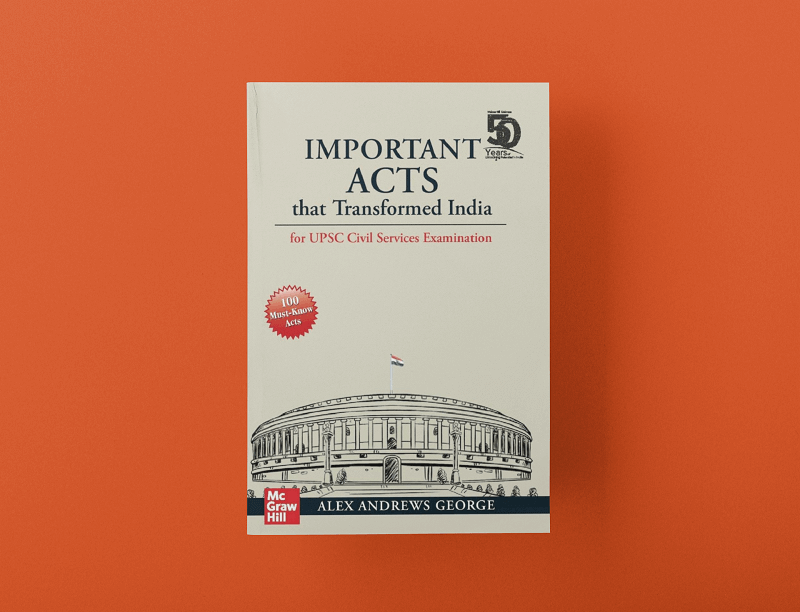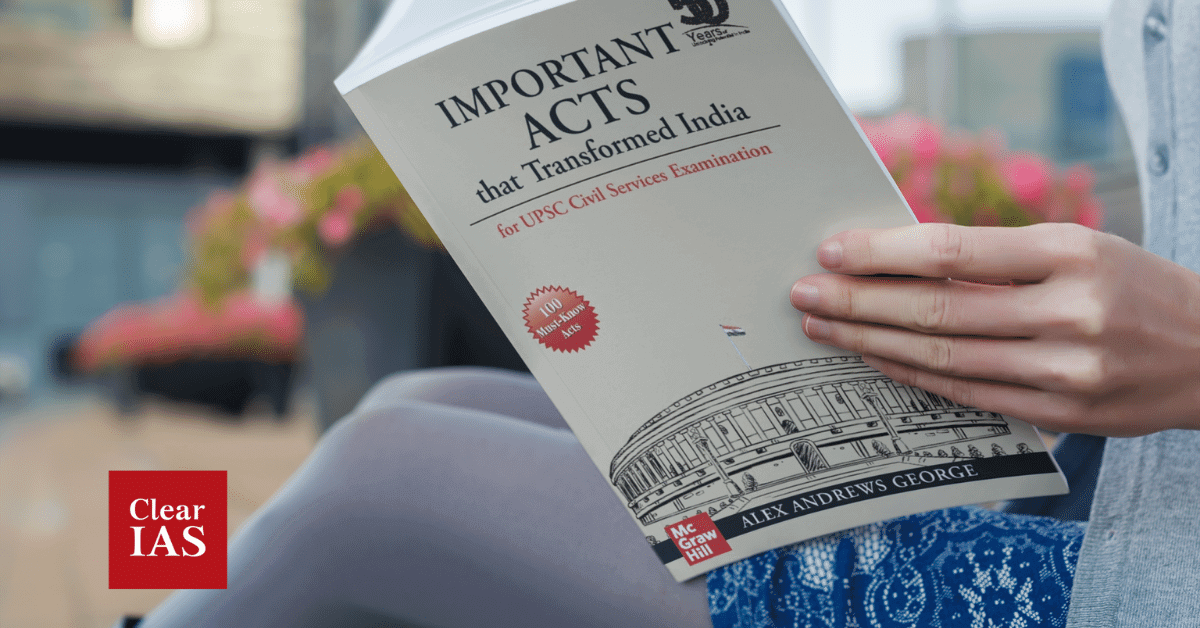Which is the most important topic in the UPSC Civil Services Examination?
In UPSC Civil Services Examination, questions are framed from many subjects like Polity, Economy, Environment, History etc. Each subject can be divided into different topics.
Analysing previous year question papers, one can see that certain topics are given more priority by UPSC. Out of the high-priority topics, do you know which area is most important from the UPSC exam perspective?
Answer: Acts enacted by the Indian Parliament (Legislature): Pre-Independence era to present.
Very Important Topic for UPSC Prelims and Mains
Parliamentary legislation is not just connected with Indian Polity. Every subject like Polity, Economy, Environment, Technology, Disaster Management, or Society is connected with many legislation. These Acts are well-linked with our day-to-day life. That’s the reason for the high-weightage for this topic.
22 Marks in UPSC Prelims and 65 Marks in UPSC Mains (2019)
Questions worth 22 marks in UPSC Civil Services Exam (Prelims) 2019 were from Important Acts enacted by Indian Parliament. There is no surprise in this because UPSC expects future Civil Servants to be knowledgeable about the important Acts/Bills/Rules etc.
Cut-off marks in UPSC Civil Services Preliminary Exam 2019 for general category was 98 marks out of 200.
Out of this, more than 1/5th of the marks could have been easily got, if aspirants knew the provisions of the important acts.
Questions in UPSC CSE Prelims 2019 from the topic ‘Important Acts’
Qn 1) Which of the following statements is/are correct regarding the Maternity Benefit (Amendment) Act, 2017?
- Pregnant women are entitled to three months pre-delivery and three months post-delivery paid leave.
- Enterprises with crèches must allow the mother a minimum of six crèche visits daily.
- Women with two children get reduced entitlements,
Select the correct answer using the code given below:
(a) 1 and 2 only
(b) 2 only
(c) 3 only
(d) 1, 2 and 3
Qn 2) In India, ‘extended producer responsibility’ was introduced as an important feature in which of the following?
(a) The Bio-medical Waste (Management and Handling) Rules, 1998
(b) The Recycled Plastic (Manufacturing and Usage) Rules, 1999
(c) The e-Waste (Management and Handling) Rules, 2011
(d) The Food Safety and Standard Regulations, 2011
Qn 3) Consider the following statements:
- As per law, the Compensatory Afforestation Fund Management and Planning Authority exists at both National and State levels.
- People’s participation is mandatory in the compensatory afforestation programmes carried out under the Compensatory Afforestation Fund Act, 2016
Which of the statement given above is/are correct?
(a) 1 only
(b) 2 only
(c) Both 1 and 2
(d) Neither 1 nor 2
Qn 4) Consider the following statements
- As per the recent amendment to the Indian Forest Act, 1927, forest dwellers have the right to fell the bamboos grown on forest areas
- As per the Scheduled Tribes and Other Traditional Forest Dwellers (Recognition of Forest Rights) Act, 2006, bamboo is a minor forest produce.
- The Scheduled Tribes and Other Traditional Forest Dwellers (Recognition of Forest Rights) Act, 2006 allows ownership of minor forest produce to forest dwellers.
Which of the statements given above is/ are correct?
(a) 1 and 2 only
(b) 2 and 3 only
(c) 3 only
(d) 1, 2 and 3
Qn 5) Consider the following statements
- According to the Indian Patents Act, a biological process to create seed can be patented in India.
- In India, there is no Intellectual Property Appellate Board.
- Plant varieties are not eligible to be patented in India.
Which of the statements given above is/are correct?
(a) 1 and 3 only
(b) 2 and 3 only
(c) 3 only
(d) 1, 2 and 3
Qn 6) The Environment Protection Act, 1986 empowers the Government of India to
1. State the requirement of public participation in the process of environmental protection, and the procedure and manner in which it is sought
2. Lay down the standards for emission or discharge of environmental pollutants from various sources
Which of the statements given above is/are correct?
(a) 1 only
(b) 2 only
(c) Both 1 and 2
(d) Neither 1 nor 2
Qn 7) As per the Solid Waste Management Rules, 2016 in India, which one of the following statements is correct?
(a) The waste generator has to segregate waste into five categories
(b) The Rules are applicable to notified urban local bodies notified towns and all industrial townships only.
(c) The Rules provide for exact elaborate criteria for the identification of sites for landfills and waste processing facilities.
(d) It is mandatory on the part of the waste generator that the waste generated in one district cannot be moved to another district.
Qn 8) As per the Industrial Employment (Standing Orders) Central (Amendment) Rules, 2018
- If rules for fixed-term employment are implemented, it becomes easier for the firms/companies to lay off workers.
- No notice of termination of employment shall be necessary in the case of a temporary workman.
Which of the statements given above is/are correct?
(a) 1 only
(b) 2 only
(c) Both 1 and 2
(d) Neither 1 nor 2
Qn 9) Consider the following statements about ‘the Charter Act of 1813’:
- It ended the trade monopoly of the East India Company in India except for trade in tea and trade with China.
- It asserted the sovereignty of the British Crown over the Indian territories held by the Company.
- The revenues of India were now controlled by the British Parliament.
Which of the statements given above are correct?
(a) 1 and 2 only
(b) 2 and 3 only
(c) 1 and 3 only
(d) 1, 2 and 3
Qn 10) Consider the following statements:
- The motion to impeach a Judge of the Supreme Court of India cannot be rejected by the Speaker of the Lok Sabha as per the Judges (Inquiry) Act, 1968.
- The Constitution of India defines and gives details of what constitutes incapacity and proved misbehaviour of the Judges of the Supreme Court of India.
- The details of the process of impeachment of the Judges of the Supreme Court of India are given in the Judges (Inquiry) Act, 1968.
- If the motion for the impeachment of a Judge is taken up for voting, the law requires the motion to be backed by each House of the Parliament and supported by a majority of the total membership of that house and by not less than two-thirds of total members of that House present and voting.
Which of the statements given above is/are correct?
(a) 1 and 2 only
(b) 3 only
(c) 3 and 4 only
(d) 1, 3 and 4 only
Qn 11) Consider the following statements:
- The Parliament (Prevention of Disqualification) Act, 1959 exempts several posts from disqualification on the grounds of ‘Office of Profit’.
- The above-mentioned Act was amended five times.
- The term ‘Office of Profit’ is well defined in the Constitution of India.
Which of the statements given above is/are correct?
ClearIAS releases a new book ‘Important Acts that Transformed India’ to save your time!

Even though most coaching institutes are still not aware, the requirements of the UPSC exam has undergone a lot of changes in recent years. Traditional methods of preparation are no longer sufficient to succeed in the ‘IAS Exam‘. The sources from which UPSC picks questions have also changed. The conventional textbooks are not enough to answer questions like the ones mentioned above.
This is the reason why me and my team, along with my publisher McGraw Hill, invested a lot of time and effort to come up with a new book ‘Important Acts that Transformed India‘. We intend to save a lot of time and effort of aspirants.
This book is an all-in-one book which covers all important Acts, Rules, and Regulations relevant for UPSC Civil Services Examination (CSE) General Studies Papers – I, II, III, and IV.
Just go through the Table of Contents of Important Acts that Transformed India to understand the structured approach of the book.
The book uses a unique approach which divides 100 must-know Acts topic-wise – into 12 Parts correlating with the subjects in the latest UPSC CSE Syllabus. Each chapter (Act) is divided into – introduction, background, objective, main provisions, amendments, criticism, importance and impact.
‘Important Acts’ is a high priority Area for UPSC Main Exam as well
In UPSC Civil Services Main Exam 2019, Questions worth 65 marks were directly asked from the topic ‘Important Acts that Transformed India‘. Indirect questions or applications were a lot more. Aspirants should note that questions from Acts are asked not just in General Studies Paper 2, but all 4 papers.
- Qn 2019) On what grounds a people’s representative can be disqualified under the Representation of Peoples Act, 1951? Also, mention the remedies available to such person against his disqualification. (UPSC CSE 2019, General Studies Paper 2)
- Qn 2019) Enumerate the indirect taxes which have been subsumed in the Goods and Services Tax (GST) in India. Also, comment on the revenue implications of the GST introduced in India since July 2017. (UPSC CSE 2019, General Studies Paper 3)
[Hint: Goods and Service Tax Act, 2017] - Qn 2019) How is the Government of India protecting traditional knowledge of medicine from patenting by pharmaceutical companies? (UPSC CSE 2019, General Studies Paper 3)
[Hint: The Patents Act, 1970] - Qn 2019) Indian Government has recently strengthened the anti-terrorism laws by amending the Unlawful Activities (Prevention) Act (UAPA), 1967 and the NIA Act. Analyze the changes in the context of prevailing security environment while discussing the scope and reasons for opposing the UAPA by human rights organizations. (UPSC CSE 2019, General Studies Paper 3)
- Qn 2019) There is a view that the Official Secrets Act is an obstacle to the implementation of the Right to Information Act. Do you agree with this view? Discuss. (UPSC CSE 2019, General Studies Paper 4)
Conclusion
Analysis of previous year UPSC questions points out that, every year a lot of questions are directly and indirectly asked from the topic – Acts enacted by the Parliament.
In CSE 2019 (Prelims), 11 questions (worth 22 marks) asked by UPSC were directly related to specific laws. In CSE 2020 Prelims, 6 questions worth 12 marks were asked from this topic.
UPSC not only asked about recent acts but also about those acts enacted years before. If you analyse previous year questions, you can see that the questions were not just about acts. The law-specific questions included bills, rules, and even regulations.
The same trend was seen in UPSC CSE Mains 2019 as well.
Aspirants preparing for upcoming UPSC exams are recommended to make the most out of our latest book ‘Important Acts that Transformed India.
Considering this as an evergreen topic, the Return on Investment on the 100 Acts mentioned in the book will be really high in UPSC Civil Services Exam.
PS: You can now order ‘Important Acts’ book at a discounted price on Amazon. The books will be shipped as soon as possible so that aspirants preparing for UPSC CSE this year will not lose the opportunity!







Leave a Reply